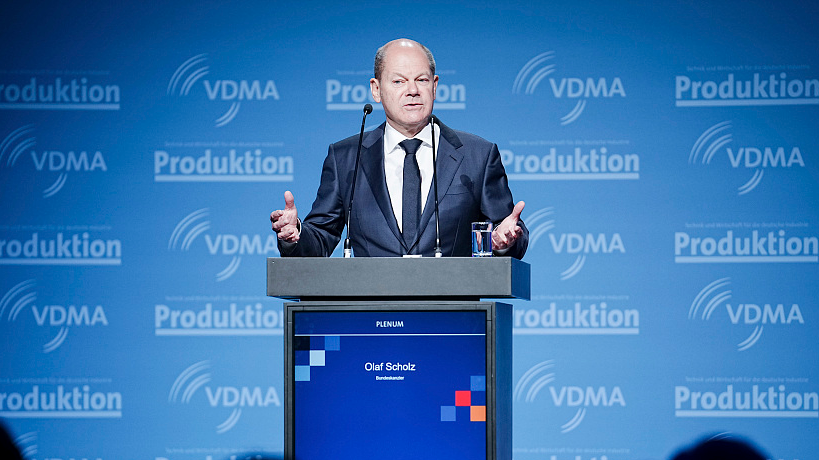
German Chancellor Olaf Scholz addresses participants at the 13th German Mechanical Engineering Summit in Berlin, Germany, October 11, 2022. /CFP
German Chancellor Olaf Scholz addresses participants at the 13th German Mechanical Engineering Summit in Berlin, Germany, October 11, 2022. /CFP
The Chinese Foreign Ministry on Wednesday welcomed the "positive comment" made by German Chancellor Olaf Scholz and other European leaders on rejecting attempts at decoupling or isolating countries from the global economy.
At the 13th German Mechanical Engineering Summit in Berlin on Tuesday, Scholz reiterated the importance of globalization for realizing prosperity and opposed decoupling from countries, including China.
"We see the relevant remarks from the European side as a positive comment," said Chinese Foreign Ministry spokesperson Mao Ning at a regular briefing in Beijing. "China also supports globalization and opposes decoupling."
Given the current state of the world economy, promoting openness and cooperation and boosting trade will not only benefit China and Europe, but also be conducive to the world's economic recovery, she added.
'Decoupling from China is not an option'
Scholz on Tuesday said besides building more comprehensive and stable trade relations with the European Union (EU), Germany should carry out trade with many other countries, including China and emerging countries in Asia, Africa and Latin America, instead of decoupling.
EU Commissioner for Trade Valdis Dombrovskis echoed Scholz's views at the summit.
"Decoupling from China is not an option for companies in the European Union," he said, calling China an important growth market and a valuable source of affordable investment.
"The EU should continue engaging with China with pragmatism and without naivety. Our trading relationship needs more balance and reciprocity," Dombrovskis said.
German machinery makers also want to maintain close trade ties with China. The industry is highly dependent on foreign trade, with exports accounting for about 80 percent of its trade volume. In August, foreign orders for German machinery industry rose by 2 percent from the previous month, while domestic orders fell by 6 percent.
In 2021, bilateral trade between China and Europe hit $800 billion for the first time, with accumulated two-way investment exceeding $270 billion, according to Mao.
The spokesperson added that bilateral trade reached $575.22 billion from January to August this year, up 8.8 percent year on year, and EU investment in China was $7.45 billion, a surge of 121.5 percent compared with the same period of last year.
(With input from agencies)